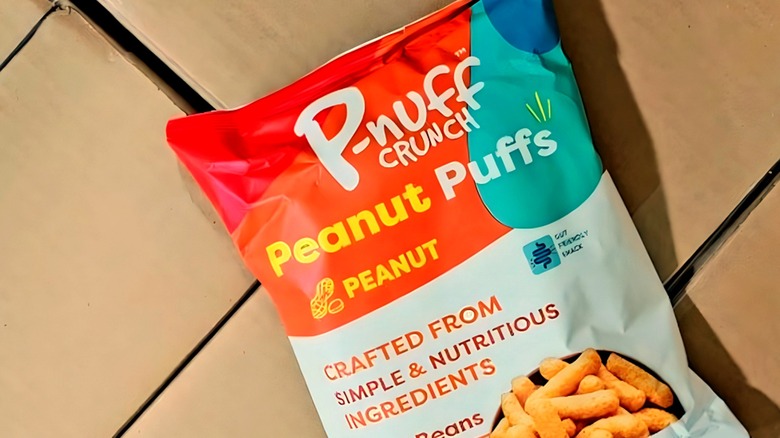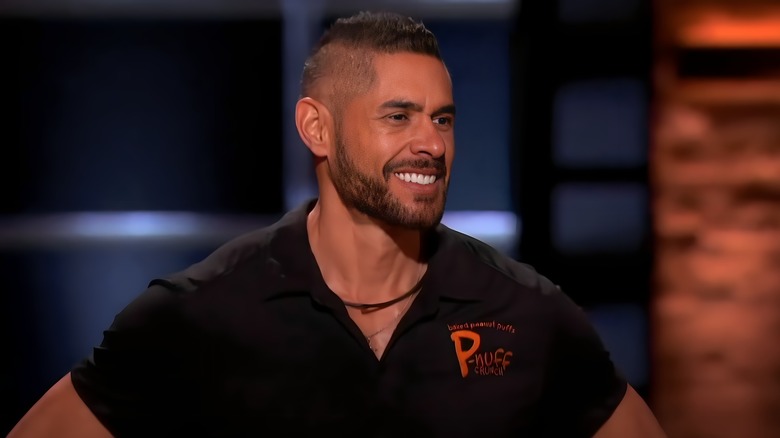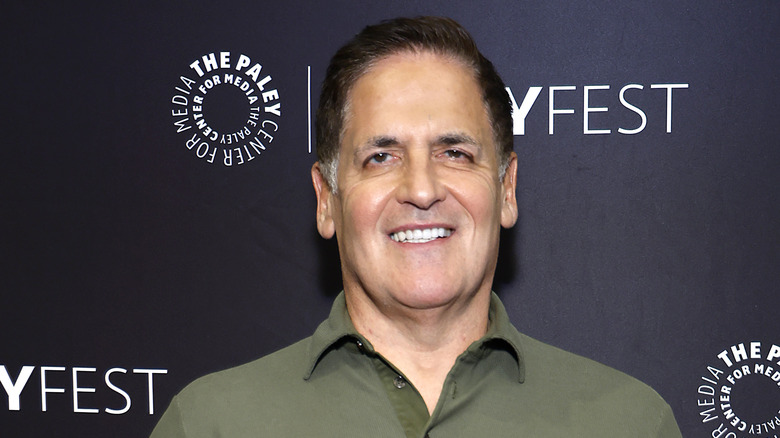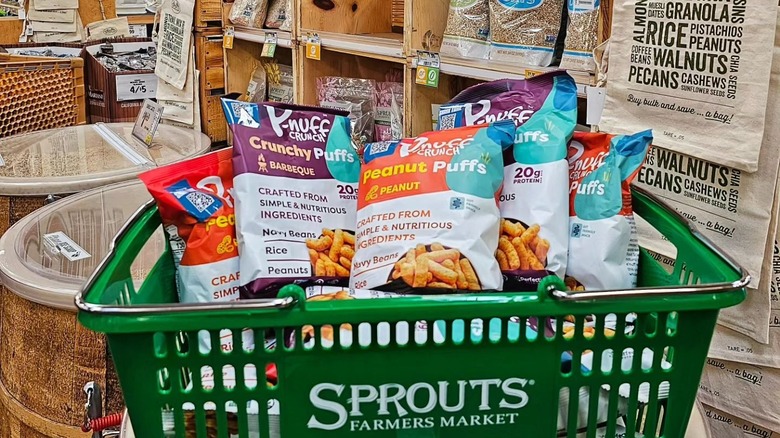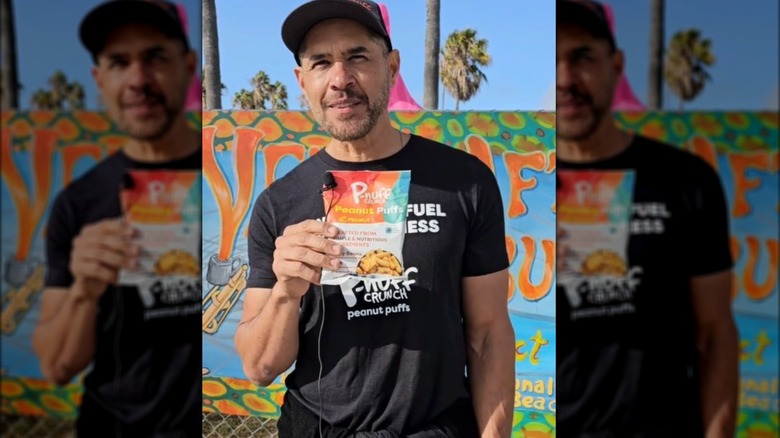P-Nuff Crunch: Here's What Happened After Shark Tank
We may receive a commission on purchases made from links.
P-nuff Crunch is a low-fat, high-protein, fiber-rich snack with a short ingredients list, including ground navy beans, white rice, organic cane sugar, brown rice protein, roasted peanuts, and salt. The snack may also include a few spices and natural extracts, depending on the flavor. Founder Dr. Juan Salinas created the company Perfect Life Nutrition in 2015, aiming to create nutritious, vegan snacks. To fuel the company, Salinas used his passion for fitness, health-oriented mindset, and two decades of experience working in snack development at companies like Kraft, Nabisco, Cadbury, and Nestle.
Juan Salinas appeared in front of investors Kendra Scott, Barbara Corcoran, Lori Greiner, Kevin O'Leary, and Mark Cuban on Episode 2 of Season 12 of Shark Tank, which aired in 2020. After a quick pitch where he talked about his background in food science and sports nutrition, Salinas mentioned his experience in competitive bodybuilding, and ripped off his white lab coat to reveal his athletic figure. Amid hooping, hollering, and laughter from the Sharks, Salinas revealed his asking price of $300,000 dollars in exchange for a 10% stake in his company, and he threw in several muscle-flexing poses for good measure. While his pitch was certainly unique, you may wonder what became of Perfect Life Nutrition's P-nuff Crunch product.
What happened with P-nuff Crunch on Shark Tank?
Juan Salinas brought the original roasted peanut, cinnamon, and cocoa flavors of P-nuff Crunch to Shark Tank for sampling. At the time that Salinas appeared on the show, P-nuff Crunch was available in 450 stores. With a retail price between $3.29 and $3.99 and a production cost of $.75 per bag, profit margins were looking good. However, sales were initially quite low — only $104,000 in the year before Salinas appeared on TV.
Salinas explained that this was because he had trouble securing a manufacturer. Companies were not willing to take on the product because peanuts are a common allergen that can contaminate all other products made in a single facility. Though Mark Cuban pointed out that Salinas would have steep competition for grocery store shelf space, Cuban ultimately decided to make an offer. Cuban had actually previously tried P-nuff Crunch, loved it, and struggled to find it in stores to buy it again.
While he did say he would give Salinas the asked-for amount of $300,000, Cuban increased the equity share to 25%. Salinas countered with 15%. Cuban held firm, but after a push from Salinas, he upped the cash investment to $400,000. The other sharks urged Salinas to take the offer, but Salinas gave it one more go and countered by offering 20% equity. It was a bold move, but Cuban maintained the previous offer. Salinas agreed — clearly both the founder and investor believed in the potential of the product.
How did P-nuff Crunch do after appearing on Shark Tank?
Juan Salinas had actually applied to be on Shark Tank two years before his company was cast. He had specific goals for his appearance, beyond securing the financial support, strategic guidance, and professional connections from an investor relationship. He knew that being on such a popular program would create visibility and brand awareness for his product. Indeed, immediately after the premiere of the episode, P-nuff Crunch's sales increased by almost 1000%, and the company continued to see spikes in online sales every time the episode aired.
With help from the investment from Mark Cuban, the company was able to start production out of its own facility. Salinas wrote in a P-nuff blog that "strategic budgetary decisions were also made to improve sales and marketing initiatives, allowing P[-]nuff to further widen their market reach." The biggest goal that Salinas had for P-nuff Crunch was to continue to grow revenue. Online sales were important for the company, but he wanted to deepen his reach in a retail setting. Creating more savory flavors for the unique peanut puffed snacks was also an exciting development following Mark Cuban's investment.
Is P-nuff Crunch still in business?
The ingredients that make up P-nuff Crunch are unique — namely the combination of rice, peanuts, and navy beans — and distinguish it from other products on the market. This may be part of the reason why the brand is still going strong. Using beans as the base makes the snack quite nutritionally dense. The original flavor has five grams of protein, three grams of fiber, and only two grams of sugar. P-nuff Crunch uses a few different protein sources, and they all come together to create a product that counts as complete plant-based protein, which means that it includes all nine essential amino acids (per The Cleveland Clinic). Juan Salinas' goal from the start was to create a snack that wasn't just a comparatively healthier choice, but also nutrient-dense.
Beyond the original three sweet flavors, P-nuff Crunch now comes in two savory offerings: barbecue and cheddar jalapeño. The barbecue version gets its flavor from a combination of tomato, onion, garlic, chili, and vinegar powders. The cheddar jalapeño flavor uses pinto bean flour, paprika, jalapeño, green bell pepper, yeast extract, and garlic powder, but is still completely vegan. In addition to being sold on the company's website and Amazon, P-nuff Crunch products are now available at Whole Foods, Wegmans, Sprouts, ShopRite, Central Market, Sierra, and Walmart.
Is Dr. Juan Salinas still involved with P-nuff Crunch?
Juan Salinas remains very involved with P-nuff Crunch as the company's chief executive officer. He writes blog posts that go in-depth about the different flavors, how P-nuff Crunch can be a part of a healthy lifestyle, and even workout tips. He came up with a 34 day fitness program that includes a complementary meal plan, which of course features P-nuff Crunch. On Instagram, you can see Salinas hitting the road and giving out samples of the dairy-free snacks he loves, as well as checking out P-nuff crunch in stores and attending trade shows. He also has appeared in YouTube videos and other video programs, giving interviews about his experience as an entrepreneur and his perspective on health and nutrition.
Interestingly, a constraint that the company originally faced has now become an opportunity. Because Salinas could not find a factory to produce his product, he invested in his own operation. Now, his East Coast facility is a rarity in that it makes an extruded peanut product. That means that Salinas has the capability to make a whole variety of peanut-based products (which contributes to high-protein servings), and even other brands may use the company's equipment. With plant-based snacks continuing to be amongst the hottest food trends, it seems like P-nuff Crunch has a promising future.

